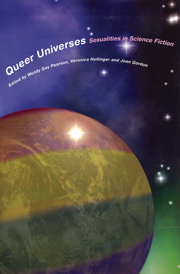Book contents
- Frontmatter
- Contents
- Acknowledgements
- Notes on Contributors
- Introduction: Queer Universes
- Part I Queering the Scene
- Part II Un/Doing History
- Sextrapolation in New Wave Science Fiction
- Towards a Queer Genealogy of SF
- Sexuality and the Statistical Imaginary in Samuel R. Delany's Trouble on Triton
- Stray Penetration and Heteronormative Systems Crash: Queering Gibson
- Part III Disordering Desires
- Part IV Embodying New Worlds
- Works Cited
- Index
Stray Penetration and Heteronormative Systems Crash: Queering Gibson
from Part II - Un/Doing History
- Frontmatter
- Contents
- Acknowledgements
- Notes on Contributors
- Introduction: Queer Universes
- Part I Queering the Scene
- Part II Un/Doing History
- Sextrapolation in New Wave Science Fiction
- Towards a Queer Genealogy of SF
- Sexuality and the Statistical Imaginary in Samuel R. Delany's Trouble on Triton
- Stray Penetration and Heteronormative Systems Crash: Queering Gibson
- Part III Disordering Desires
- Part IV Embodying New Worlds
- Works Cited
- Index
Summary
Even though literary cyberpunk is ‘a product of the Eighties milieu’ (Sterling x), it still continues to exert a cultural impact, as evidenced by ongoing critical attention, popularity, and dissemination of its motifs. The key figure in cyberpunk lore is William Gibson and its key texts are Gibson's first trilogy, Neuromancer (1984), Count Zero (1986), and Mona Lisa Overdrive (1988). In spite of its popularity, however, there have also been significant critiques of Gibson's fiction in particular and of cyberpunk in general. Nicola Nixon, in her influential feminist essay ‘Cyberpunk: Preparing the Ground for Revolution or Keeping the Boys Satisfied?’ (1992), argues that cyberpunk conceals ‘a complicity with '80s conservatism’ (231), a conservatism that can be interpreted as reinforcing traditional sexualities. In her essay ‘Feminist Cyberpunk’ (1995), Karen Cadora concludes that, with its focus on ‘the male-dominated fields of computers, science, and sf, masculinist cyberpunk is ripe for the homoerotic. Sadly, fierce queens and flaming queers are absent from the pages of traditional cyberpunk. Indeed, cyberpunk is characterized by its rather rampant heterosexuality’ (361).
Cyberpunk's rampant heterosexuality and patriarchal foundations are perhaps not surprising; after all, sf has a history of privileging male figures and, as Veronica Hollinger observes, sf remains ‘an overwhelmingly straight discourse, not least because of the covert yet almost completely totalizing ideological hold heterosexuality has on our culture's ability to imagine itself otherwise’ (24).
- Type
- Chapter
- Information
- Queer UniversesSexualities in Science Fiction, pp. 121 - 138Publisher: Liverpool University PressPrint publication year: 2010

